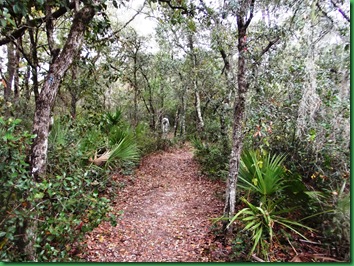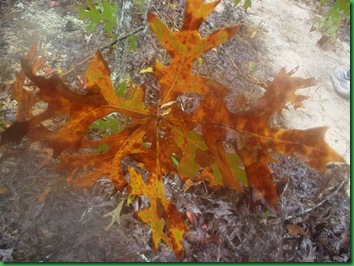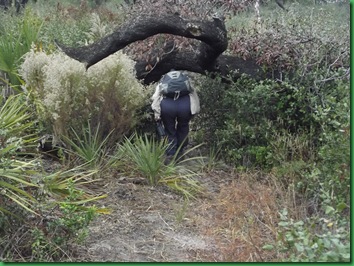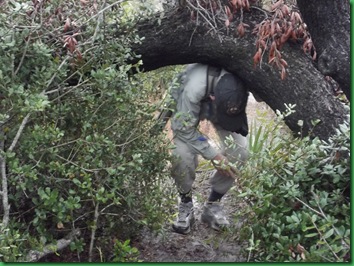Wednesday November 14, 2012
Site 81 Salt Springs Recreation Area
Salt Springs Florida
*Back to the past. I know this is confusing but I’ve gotten behind and yet I want these posts to remember what we’ve done. Hope you don’t mind that I stuck in a current Thanksgiving blog yesterday.
Now I’m jumping back to nearly 10 days ago.
Wish I could figure out what to leave out or find more time to keep up.
Wednesday is another overcast threatening to rain day so kayaking Juniper Spring is out again. Instead we go over to hike Pat’s Island trail. And what a great hike it turns out to be.
There are two access points to the trail. One is off of the Florida National Scenic Trail and one across the road from Silver Glen Springs. The former is very slightly shorter but a longer drive 2.3 miles down a sandy road. The latter is the more commonly used entrance and is right on the main road FL 19.
We pick the less popular entrance and find not a soul there.
The land the trail crosses within the National Forest is the largest concentration of sand pine scrub in the world. Within this area there are oases of fertile soils and moisture that support growth of longleaf pine, wiregrass, turkey oak and other trees and plants not found in the surrounding arid scrub.
This section of the forest is known as the Juniper Prairie Wilderness.
We thought the entrance signs were very interesting.
The area was named Pat’s Island after its first postmaster, Patrick Smith, who settled there in the 1840’s and the unique relationship of the two ecosystems long leaf pine and sand pine scrub.
We didn’t go far before we found the long leaf pines. Big cones and big “leaves”. Those pine needles were 14-18” in length. It was amazing to me.
And these are just the youngsters.
the pine scrub
Florida’s Scrub jay
I was surprised to see cactus here. Somehow I always think of it as a plant of the desert.
Because we didn’t start at the “front” of the trail parking across from Glen Springs, the first marker we come to on the trail is #5 which looks like “Two Roads diverged into a wood…” to me. But it was really the Patrick Smith Home site. Not a trace of home or Patrick remained 172 years after he was the first settler of “the island”.
The Reuben Long family came to the area around 1872 and individual family members were granted homestead acres.
David’s looking down into a sink hole where residents of the island got their drinking water.
No water in there today.
But no people needing it here either.
We use it as a nice spot for our picnic lunch.
Human habitation on the island peaked before the turn of the 20th century when about a dozen families tried to eke out a living on the 1400 acre island.
This “cattle dip” dates back to the 1920’s.
But there was no explanation about what a cattle dip was and how the cattle got into this narrow box. There were steps but really, could you lead the cattle down them??
I asked the all knowing google about cattle dips while writing
this post. Here’s what they said.
From the 1910's through the 1950's, these vats were filled with an arsenic solution for the control and eradication of the cattle fever tick. Other pesticides such as DDT where also widely used. By State law, all cattle, horses, mules, goats, and other susceptible animals were required to be dipped every 14 days. Under certain circumstances, the arsenic and other pesticides remaining at the site may present an environmental or public health hazard.
The state is investigating these sites for possible clean up. The following link shows there are literally thousands of them in nearly every county in Florida.
http://www.dep.state.fl.us/waste/quick_topics/publications/wc/CattleVats.pdf
These are the leaves of the Turkey Oak which I found lovely on this fall day as we hiked through such varied habitats in such a relatively
small area.
The only other folks on the trail turned out to be a couple who had moved from “the north” to Atlanta recently and were now
really enjoying travel to North Central Florida.
Their dogs were not enjoying the burrs in their paws.
We discussed that Santa might bring them hiking boots.
The dogs that is.
There is an ecological uniqueness of a longleaf pine island surrounded by scrub pine, which created a single community isolated from the mainstream of central Florida life. The imposed remoteness contributed to a community essentially untouched by outside forces.
Marjorie Kinnan Rawlings stayed with the last two inhabitants of the island, Calvin and Mary Long, in October 1933. During this and other visits, she recorded many stories told by the Longs. Calvin’s childhood story of nursing a deer from a fawn gave her the idea for the Pulitzer Prize winning novel “The Yearling”.
Marker #10 was the Calvin Long home site used for the filming of the movie The Yearling in the early 1940’s. David can’t find a trace of the buildings remaining. We wonder if the National Forest required the Hollywood folks to build them and remove them.
I love the beauty of these tall straight pines.
Mother Nature doesn’t plant her pine plantations in rows.
Life was hard on the island and after the big back-to-back freezes of 1894 and 1895 the population began to decline. Most of the settlers had sold or leased their homesteads before the Ocala National Forest was formed in 1908. By 1935, the island was abandoned by its residents and surrendered back to the elements after less than 100 years of human occupation.
Here David is approaching the Long Cemetery.
Looks like some Halloweeners were here.
This would be a fabulous place on a dark and spooky night.
Matriarch Sarah Jane Long’s Grave.
Calvin was her son.
Reuben was her husband.
This is a long leaf pine imitation. I don’t quite seem to have it.
The last leg of our hike had numerous trail vertical challenge hazards.
Finally a place where being short is beneficial.
If you are ever near either Salt Springs or Juniper Springs we recommend Pat’s island as an excellent hike. We really enjoyed its uniqueness and would love to hike the trail again.



















































Another great hike with interesting history along the way to boot.
ReplyDeleteKeeping the blog going while you're out adventuring has got to be one of the biggest challenges of a blogger ... not sure how I am going to manage once we're on the road either ... for me, it's processing the photos that takes time since I shoot RAW ... perhaps I am going to have to give up that for the blog and just shoot JPEG ... time will tell.
It's on our list...lovely hike...thanks!!
ReplyDelete14-18" pine needles? that's just what I need for my pine needle baskets! I can only find ones about 10" or less here in the park. Made a note to maybe try and get there some how on a day trip when we get to Florida. Loved the oak photos, so pretty!
ReplyDeleteI was surprised by the cactus at Fort Pickens too. Was it brought in, or am I just not up on where cactus grows? :)
ReplyDeleteThanks for the great tour, this will be added to our list of places to visit. Happy to see both of you out enjoying life.
ReplyDeleteYou find the coolest and most interesting places to hike. A virtual history tour, too! Loved your post, I found the cattle dips amazing. So sad that long ago they had no idea what they were doing to the environment trying to solve a problem.
ReplyDeleteI love the posts that step back in time and present life as it was...and hiking too! Great post!!
ReplyDeleteLove those long-needled pines. Such diversity along this trail. And nice history as well.
ReplyDeleteLooks nice and quiet! I'll definitely keep it in mind for this winter, especially since pups are allowed :-).
ReplyDeleteGreat post. I think of all the settlers, those in Florida were an especially hardy bunch. It is rough country even today.
ReplyDeleteGreat pictures. I'm really enviour of your proximity to such great places to hike.
ReplyDeleteReally nice to see you guys out hiking again. We're always intrigued by very old cemeteries, and that cemetery looks like an interesting one.
ReplyDeleteThat looked like a beautiful hike!! Loved those oak leaves!! The long needle pines too..
ReplyDeleteI enjoyed the history sprinkled in this blog and found myself laughing aloud at times - i.e. the 'follow me' tombstone and poor Dad attempting to crawl under those branches - what an effort! :) The tree diversity in those woods is impressive - great job capturing that.
ReplyDeleteI know this place so well, as a Boy Scout in the 70's we explored all over this area before the feds turned it into a park. We use to find remnants of life there and pocketed many square nails and horse shoes as well as mini balls from muskets. We would refill our canteens at the larger of the two sink holes that still had an active spring. Alaska is home now and while as wild and is like living in a post card I still miss the smell of a pine forest on a hot summer day or the song of cicada and crickets. I still hike Pats Island in my dreams.
ReplyDelete